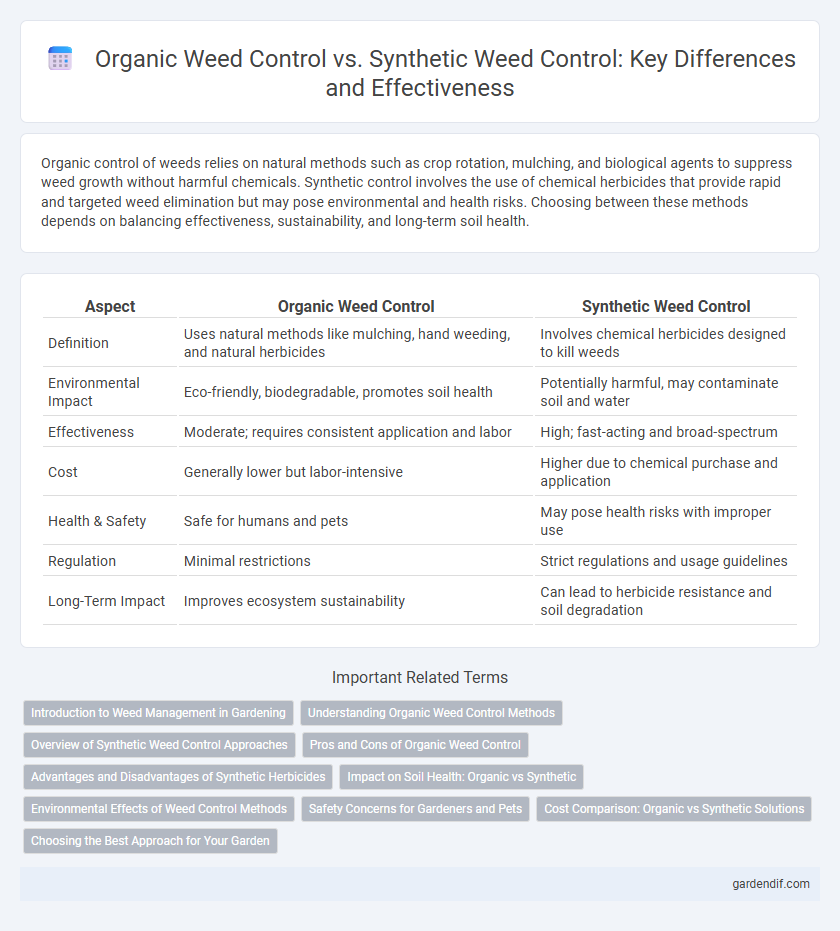
Organic control vs synthetic control Illustration
Organic control of weeds relies on natural methods such as crop rotation, mulching, and biological agents to suppress weed growth without harmful chemicals. Synthetic control involves the use of chemical herbicides that provide rapid and targeted weed elimination but may pose environmental and health risks. Choosing between these methods depends on balancing effectiveness, sustainability, and long-term soil health.
Table of Comparison
| Aspect | Organic Weed Control | Synthetic Weed Control |
|---|---|---|
| Definition | Uses natural methods like mulching, hand weeding, and natural herbicides | Involves chemical herbicides designed to kill weeds |
| Environmental Impact | Eco-friendly, biodegradable, promotes soil health | Potentially harmful, may contaminate soil and water |
| Effectiveness | Moderate; requires consistent application and labor | High; fast-acting and broad-spectrum |
| Cost | Generally lower but labor-intensive | Higher due to chemical purchase and application |
| Health & Safety | Safe for humans and pets | May pose health risks with improper use |
| Regulation | Minimal restrictions | Strict regulations and usage guidelines |
| Long-Term Impact | Improves ecosystem sustainability | Can lead to herbicide resistance and soil degradation |
Introduction to Weed Management in Gardening
Organic weed control in gardening relies on natural methods such as mulching, hand weeding, and the use of bioherbicides, promoting soil health and biodiversity. Synthetic control employs chemical herbicides designed for rapid and targeted weed suppression, often providing quicker results but potentially impacting the environment. Effective weed management combines both approaches to balance efficacy, sustainability, and long-term garden vitality.
Understanding Organic Weed Control Methods
Organic weed control methods rely on natural processes and materials such as mulch, manual weeding, and plant-based herbicides to suppress weed growth effectively. These techniques enhance soil health and biodiversity while minimizing chemical residues and environmental impact compared to synthetic herbicides. Understanding organic methods is crucial for sustainable agriculture, promoting long-term ecosystem balance and reducing dependency on synthetic chemical inputs.
Overview of Synthetic Weed Control Approaches
Synthetic weed control approaches primarily rely on chemical herbicides that target specific physiological pathways in weeds, offering rapid and effective suppression. These herbicides include pre-emergent agents like atrazine and glyphosate-based post-emergent solutions that disrupt photosynthesis or amino acid synthesis. While synthetic methods provide consistent weed management, concerns about environmental impact and herbicide resistance highlight the importance of integrating diverse control strategies.
Pros and Cons of Organic Weed Control
Organic weed control relies on natural methods such as mulch, crop rotation, and manual removal, reducing chemical residues and promoting environmental sustainability. It enhances soil health and biodiversity but often requires more labor and may be less immediately effective compared to synthetic herbicides. Organic control methods minimize risks of chemical resistance and contamination, making them suitable for organic farms and eco-friendly landscaping.
Advantages and Disadvantages of Synthetic Herbicides
Synthetic herbicides offer rapid and effective weed control, providing consistent results across diverse crop types and large agricultural areas. However, their extensive use can lead to environmental pollution, development of weed resistance, and potential health risks to humans and wildlife. Careful management and adherence to application guidelines are essential to minimize negative impacts while maximizing weed suppression efficiency.
Impact on Soil Health: Organic vs Synthetic
Organic weed control methods improve soil health by enhancing microbial activity and increasing organic matter content, which promotes nutrient cycling and soil structure. Synthetic herbicides can negatively impact soil microorganisms, leading to reduced biodiversity and potential soil degradation over time. Long-term reliance on synthetic controls may disrupt soil ecosystems, whereas organic approaches support sustainable soil fertility and resilience.
Environmental Effects of Weed Control Methods
Organic weed control methods reduce harmful chemical runoff, preserving soil health and promoting biodiversity by relying on natural herbicides and mechanical removal. Synthetic control, although effective in rapid weed suppression, often leads to soil contamination, water pollution, and negative impacts on non-target organisms due to persistent chemical residues. Choosing organic strategies supports sustainable ecosystems and long-term environmental resilience in agricultural practices.
Safety Concerns for Gardeners and Pets
Organic weed control methods typically use natural ingredients like vinegar or corn gluten, reducing the risk of exposure to harmful chemicals for gardeners and pets. Synthetic herbicides often contain toxic substances such as glyphosate, which can cause skin irritation, respiratory issues, and long-term health problems. Prioritizing organic options enhances safety by minimizing chemical residues in the garden environment, protecting both human and animal health.
Cost Comparison: Organic vs Synthetic Solutions
Organic weed control solutions typically incur higher upfront costs due to natural ingredient sourcing and labor-intensive application methods, while synthetic herbicides are often more cost-effective for large-scale usage because of mass production and concentrated formulas. However, organic options tend to reduce long-term environmental remediation expenses by promoting soil health and biodiversity, offsetting initial investments. Synthetic controls may lead to hidden costs from potential resistance development and regulatory restrictions impacting future usage.
Choosing the Best Approach for Your Garden
Organic weed control harnesses natural methods such as mulch, hand weeding, and beneficial plants to suppress weed growth without harming the environment. Synthetic control relies on chemical herbicides that provide quick and effective results but may impact soil health and beneficial organisms over time. Gardeners should evaluate the specific weed species, garden size, ecological impact, and long-term sustainability goals when choosing between organic and synthetic weed management strategies.
Organic control vs synthetic control Infographic

 gardendif.com
gardendif.com